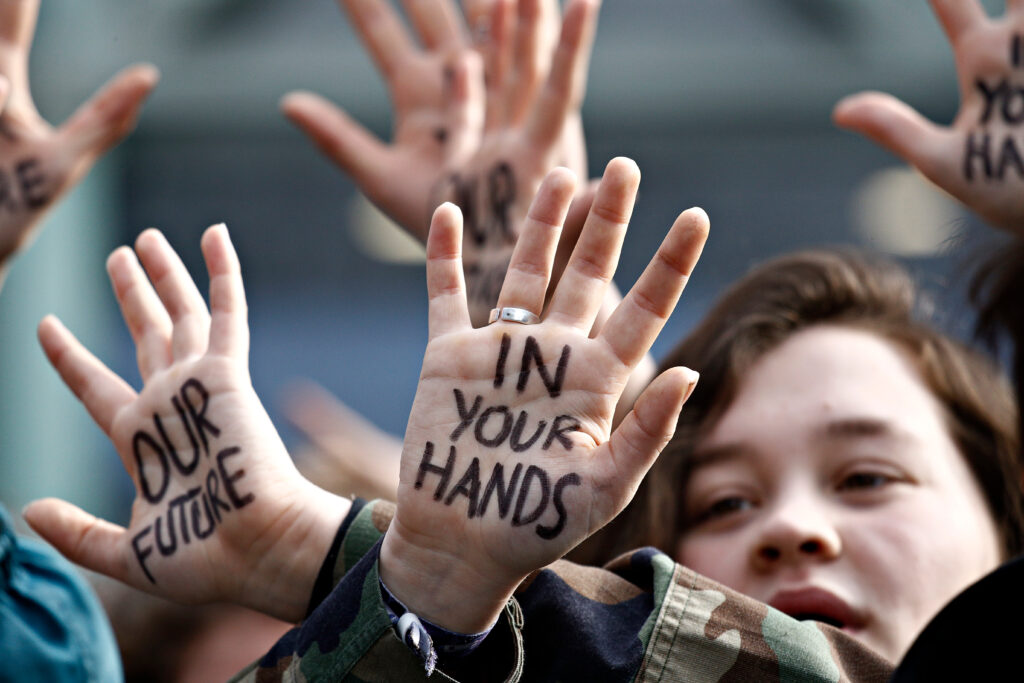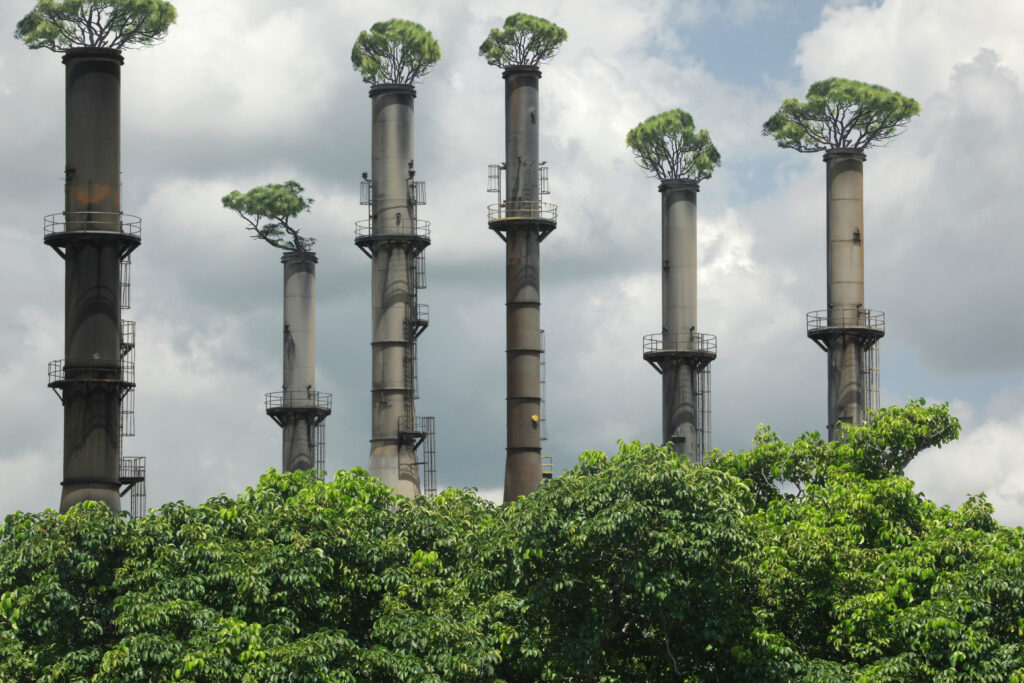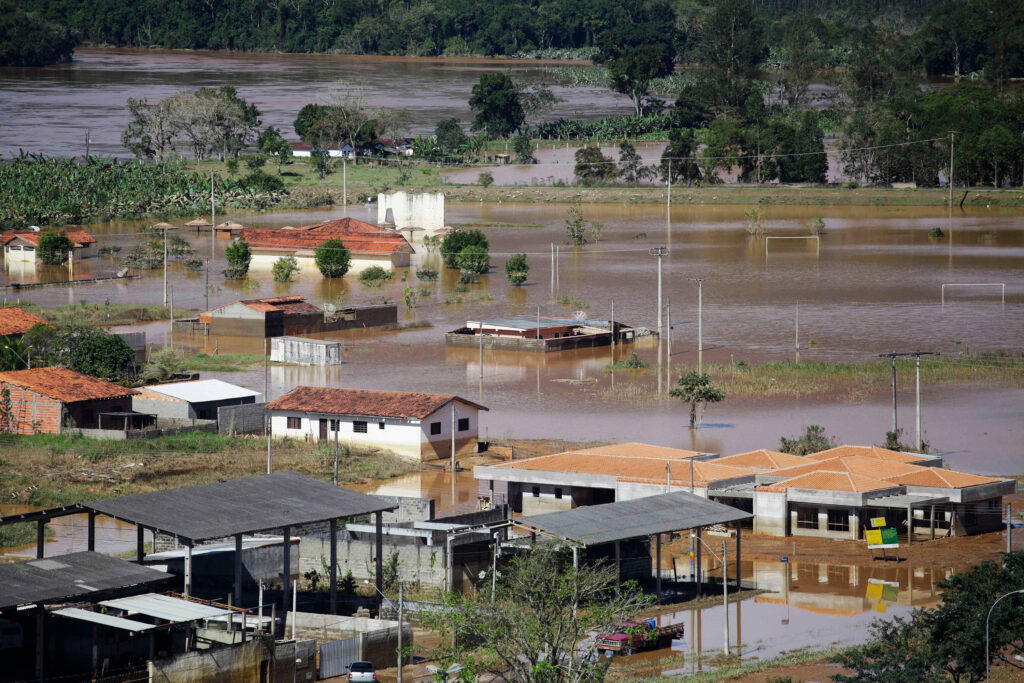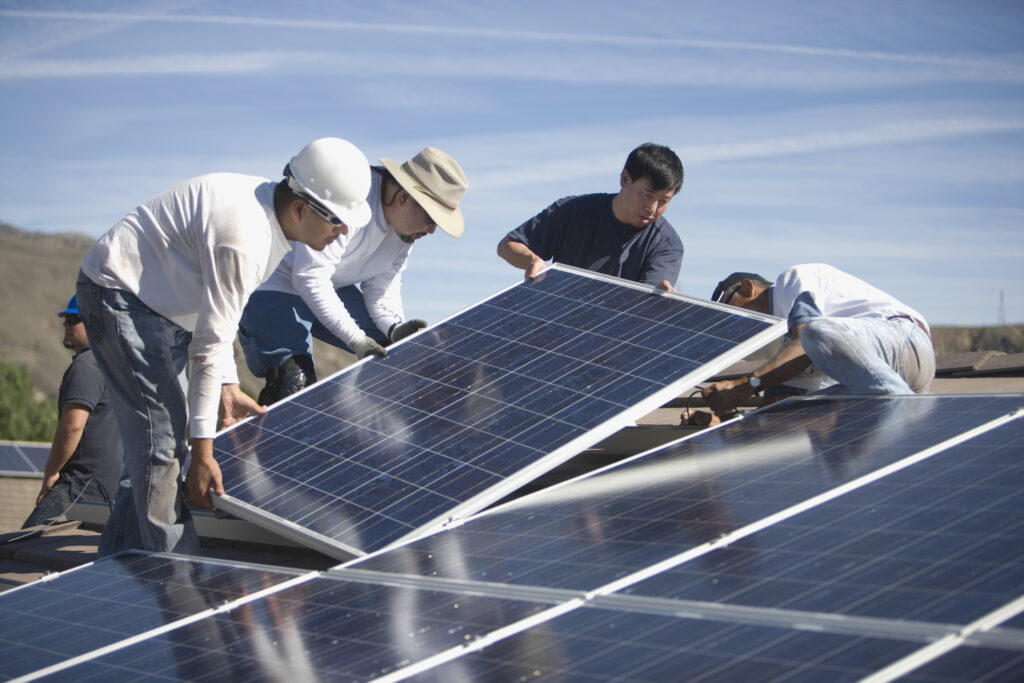

Biden described some of the jobs he had in mind: Line workers laying transmission lines for a modern, resilient electric grid. Oil and gas workers capping abandoned wells and putting a stop to methane leaks. Autoworkers turning out the next generation of electric vehicles. Engineers and construction workers building new plants to capture carbon or produce green hydrogen. Farmers deploying innovative tools to make the soil a frontier in carbon innovation.
“The countries that take decisive action now to create the industries of the future will be the ones that reap the economic benefits of the clean energy boom that’s coming,” he said.
That message was reiterated and reinforced throughout the two-day Leaders Summit on Climate, which convened 40 presidents or prime ministers from countries large and small, as well as ministers of energy, climate, finance, agriculture, and defense. More than half the members of Biden’s cabinet gave remarks or moderated panel discussions.
CEOs of major companies, heads of development banks, mayors and governors, labor union leaders, and representatives of indigenous communities were among the approximately 120 speakers. Parallel to the main event, U.S. Special Presidential Envoy for Climate John Kerry hosted two ministerial roundtables to hear from an additional 63 countries—a group he said ranged “from Armenia to Zambia, literally.”
Pope Francis greeted the summit participants and called on the world to “take care of nature so that it takes care of us.” Microsoft co-founder Bill Gates talked about the need to invest in innovation and “build the infrastructure for the transition to a clean economy.” Meanwhile, a young Mexican-Chilean activist, Xiye Bastida, demanded an end to dependence on fossil fuels and stressed that “climate justice is social justice.”
Justice was also an issue that Vice President Kamala Harris raised in welcoming the leaders. “The communities hardest hit by climate change are the same communities harmed by wealth and gender inequality, toxic air pollution, and so much more,” she said. “This truth holds around the world.”
Secretary of State Antony Blinken assured participants that the United States will mobilize resources and technical expertise from across the government, private sector, civil society, and research universities to support countries’ efforts to meet and raise their climate targets and at the same time promote economic growth and equity.

“There are many issues on which we don’t all see eye to eye. This isn’t one of them,” he said. “No matter what country we’re from, we know the world that we want to pass on to our children and our grandchildren. I can think of no better or more urgent cause to bring us together.”
The urgency of the task came through in remarks by Prime Minister Gaston Browne of Antigua and Barbuda, who spoke on behalf of the Alliance of Small Island States. “The harmful effects of climate change are growing,” he said, “and the cost of mitigation and recovery is being counted in human lives and livelihoods.”
Browne, whose own country suffered devastation from Hurricane Irma in 2017, said that over the years, the debt of many small states has risen to “unsustainable” levels due to repeated natural disasters arising from climate change. “The economic situation of our countries was already grave before the COVID-19 pandemic,” he said. “It is now dire.”
Jamaica echoed the need for more funding to address the climate challenge. (See related story in this issue.) “The world committed to $100 billion per year to support climate action in developing countries,” Prime Minister Andrew Holness reminded his fellow leaders. “It is critical that this commitment not only be honored but that the ambition be increased, and major emitters should contribute more to its financing.”

From the outset of the Leaders Summit, the United States made it clear that it has not simply rejoined the Paris Agreement but is also intensifying its support for climate action, starting with establishing a more ambitious target for reducing U.S. greenhouse gas emissions. Its new nationally determined contribution (NDC) commits the United States to achieving a 50-52% reduction over 2005 levels by 2030, up from the Obama administration’s pledged 26-28% reduction by 2025.
Several other economies announced enhanced NDCs of their own, or highlighted specific steps they are taking in line with the goal of limiting global warming to 1.5° Celsius above pre-industrial levels and getting to net zero emissions.
Among the larger economies, Canada, the European Union, and Japan strengthened their commitments to cut emissions, and the United Kingdom said its new target of a 78% reduction by 2035 will become law. South Korea said it will end all public financing for new overseas coal-fired power plants, while China said it will “strictly limit the increase in coal consumption” in the first half of this decade and start phasing it down in the second half. India reiterated its target of 450 gigawatts of renewable energy by 2030.
Canadian Prime Minister Justin Trudeau outlined some of the steps his country is taking to reach its new target of a 40-45% reduction in 2005 emission levels by 2030, including setting a price on pollution. “If major economies in the room were to follow Canada’s lead and adopt a rising price on pollution and commit to phase out coal plants, we would accelerate our global path for a safe, prosperous, net zero future,” he said.
For his part, Brazilian President Jair Bolsonaro announced that his country will become carbon-neutral by 2050, moving up its previous target by a decade. He also pledged to strengthen enforcement of forest laws and put an end to illegal deforestation in Brazil by 2030, a move he said would bring greenhouse gas emissions to nearly half the country’s 2005 levels.

Several other countries—including Argentina, Canada, Colombia, and Mexico—also mentioned protecting forests and planting trees as part of their climate action plans. Argentine President Alberto Fernández said his country will adopt measures to protect native forests and impose stricter penalties for illegal deforestation.
Mexican President Andrés Manuel López Obrador described a reforestation program called Sowing Life, in which the government pays 450,000 farmers a monthly stipend of 5,000 Mexican pesos (about $250) to plant fruit and timber trees on their plots of land. So far, he said, about 700 million trees have been planted, out of the 1 billion planned.
Chile, for its part, underscored the critical role that oceans play in regulating climate and called for the establishment of two marine protected areas, one in the Antarctic and another in a biodiverse-rich area of the Pacific known as the Nazca Ridge.
Renewable energy was another topic touched on by many leaders, including the presidents of Argentina, Brazil, Chile, and Colombia.
Colombian President Iván Duque noted that when his administration took office in 2018, nonconventional renewable energy sources accounted for only 0.5% of the country’s electricity mix; by August 2022, he said, it will be 14%. And, he said, Colombia is a leader in Latin America and the Caribbean in the electrification of urban public transportation and cargo vehicles.
Chilean President Sebastián Piñera said his country will harness its vast solar and wind resources to produce green hydrogen. “We are decarbonizing our electric network, we are becoming a carbon-neutral country, and we are electrifying our transportation system,” he said.
Nobody at the Leaders Summit on Climate suggested that the world has made enough progress. In fact, Kerry said that in his roundtable discussions with ministers, he heard “polite but obvious frustration” about the inadequacy of the global action to date.
UN Secretary-General António Guterres framed the need for action in the starkest terms. Greenhouse gases are already at levels not seen in 3 million years, he said, and global temperatures have already risen by 1.2° Celsius. The planet is “on red alert,” beset by “ever-rising sea levels, scorching temperatures, devastating tropical cyclones, and epic wildfires.”
“We are at the verge of the abyss,” Guterres said. “We must make sure the next step is in the right direction.” He called for leaders from “every country, every region, every city, every company, and every industry” to take action on climate and make the 2020s “a decade of transformation.”

“All countries, starting with major emitters, should submit new and more ambitious nationally determined contributions for mitigation, adaptation, and finance, laying out actions and policies for the next 10 years aligned with the 2050 net zero pathway,” he said.
In November of this year, the United Kingdom is scheduled to host the 26th Conference of the Parties to the United Nations Framework Convention on Climate Change—COP26, in UN parlance—in Glasgow, Scotland.
At a press briefing during the Leaders Summit, Kerry said the next six months of diplomacy will be “absolutely critical” to increase ambition on climate change—particularly among the 20 economies responsible for more than 80% of the world’s emissions, all of whose leaders attended the White House summit.
“I do believe Glasgow remains our last best hope to be able to coalesce the world in the right direction,” he said.
Kerry told reporters that the new U.S. target for emissions will be tough to meet but doable. “I think a lot of us will wind up exceeding the predictions we’re making because we’re measuring predictions by the economies we have today and by the technologies we have today,” he said.
When John F. Kennedy announced the goal of putting a man on the moon in a decade, Kerry said, nobody knew exactly how that would happen, but it did. With all the research and venture capital going into different aspects of the climate challenge today—whether energy storage, green hydrogen, or direct air carbon capture—Kerry said he is “genuinely optimistic” about the possibility of major breakthroughs.
Asked how he could be sure that the U.S. commitment to climate action would not be reversed again with the stroke of a pen, as happened under the previous administration, Kerry pointed to trends in the marketplace. Tesla, the highest-valued automobile company in the world, makes only electric vehicles, he noted, and two other major U.S. automakers, Ford and General Motors, are seeing the future in electric too.
“That is the way the market is moving,” Kerry said. “No politician,” he added, “is going to be able to change what that market is doing, because it will have moved. It’ll have four years of entrenchment. And those jobs will be there. And people will see that this is the product people want to buy.”
The challenges and opportunities of addressing climate change will be met by working people in every nation, President Biden told his fellow leaders. “As we transition to a clean energy future, we must ensure that workers who have thrived in yesterday’s and today’s industries have as bright a tomorrow in the new industries as well as in the place where they live, in the communities they have built,” he said.
“When we invest in climate resilience and infrastructure,” Biden added, “we create opportunities for everyone.”

Xiye Bastida, a 19-year-old climate justice activist, told the world’s leaders that instead of just talking about the climate crisis, they need to solve it. “We already have all of the solutions that we need, so all we have to do is implement them,” she said.
Born and raised in Mexico, Bastida now lives in New York City, where she is a local leader in Fridays for Future, an international movement of students demanding action to prevent climate change.
“She and her fellow young leaders have earned a seat at the table,” said U.S. Secretary of State Antony Blinken, in introducing Bastida at the Leaders Summit on Climate. “Not just because they will bear more of the consequences of climate change or the world’s inaction on climate, but also because of the urgency, ingenuity, and total dedication that they have brought to this effort.”
In her remarks, Bastida said communities in the Global South have disproportionately faced the negative impacts of climate change and “environmental plunder.”
“You need to accept that the era of fossil fuels is over,” she told the leaders. “We need a just transition to renewables worldwide, so that we can stop emitting carbon and focus on drawing down carbon.”
Today’s climate activists are often told that their demands are “unrealistic and unreasonable,” but what is unreasonable is countries presenting “unambitious” solutions and finding loopholes to get around their obligations, Bastida said.
“It’s time for all of us to rise together and recognize that the climate crisis is not only the biggest challenge that humanity has ever faced, but it is also the biggest opportunity that we have to change the world,” she said.
John Kerry, U.S. Special Presidential Envoy for Climate, later told reporters that he identified with the passion Bastida and other activists of her generation are bringing to the conversation on climate. “I believe in what the young folks are doing out there today,” he said. “They’re trying to get adults to be adults and do what we’re supposed to do.”
 View Map
View Map